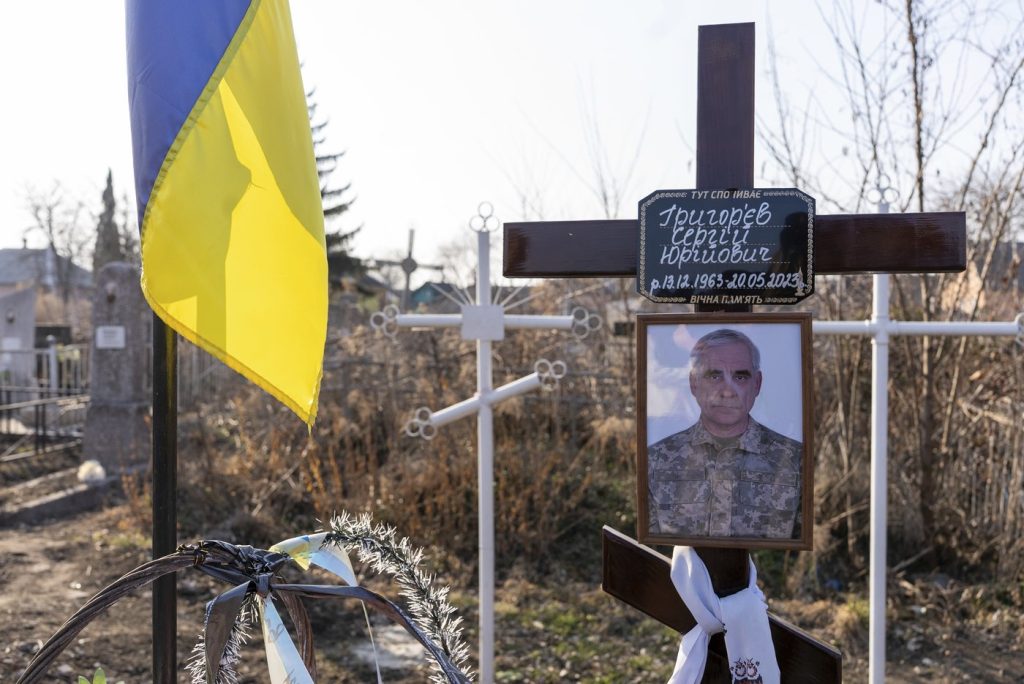KYIV, Ukraine (AP) — The story of Serhii Hryhoriev, a Ukrainian soldier, highlights the grave realities faced by prisoners of war (POWs) amid the ongoing conflict between Ukraine and Russia. Hryhoriev, who often reassured his family during phone calls with the phrase, “Everything will be all right,” was captured by Russian forces during the siege of Mariupol in 2022. His family, including his wife, Halyna, and two daughters, held onto hope for his well-being, particularly after receiving official confirmation of his status as a POW from the International Committee of the Red Cross.
However, this hope was shattered when Hryhoriev returned home in June 2023 in a body bag. A Russian death certificate indicated that he died from a stroke, but Ukrainian autopsy results suggested a different, darker narrative involving violence and medical neglect. His plight is emblematic of a larger issue, as over 200 Ukrainian POWs are reported to have died in custody since Russia’s full-scale invasion in 2022.
Human rights officials and organizations, including the U.N., have uncovered evidence indicating that many POW deaths are linked to systematic abuse within Russian prisons. Reports point to brutal treatment, lack of adequate medical care, and conditions that lead to starvation and torture, contributing to a high mortality rate among Ukrainian soldiers held captive.
Hryhoriev’s journey into captivity began in 2019, when he joined the Ukrainian army after losing his previous job. Amid the ongoing war, he was stationed in Mariupol, a city that became a battleground. His last communication with his family took place on April 10, 2022. Just two days later, they learned he had been captured following Mariupol's fall to Russian forces, which led to over 2,000 Ukrainian soldiers becoming POWs.
In a letter dated August 2022, Hryhoriev reassured his wife with the same phrase he had used before his capture, declaring, “I am alive and well. Everything will be all right.” However, as time passed, his family's optimism began to wane when they saw a video of him on social media, appearing gaunt and in distress. Fellow POW Oleksii Honcharov, who was imprisoned alongside Hryhoriev, described the degrading conditions and brutal treatment they both faced at Kamensk-Shakhtinsky Correctional Colony in southwest Russia.
With reports indicating that 95% of released Ukrainian POWs faced some form of systematic torture, testimonies from Honcharov and others revealed the harsh realities of their daily lives, which included regular beatings and neglect of medical needs. Hryhoriev's health rapidly deteriorated, but instead of receiving appropriate medical attention, he was isolated in a small, dark cell where he eventually died on May 20, 2023, according to the Russian death certificate.
Months later, Hryhoriev's family learned of his death, which was followed by the return of his body. The autopsy performed in Ukraine contradicted Russian claims about the cause of death, citing blunt trauma to the abdomen that led to internal bleeding. This tragic outcome is just one of many cases of Ukrainian POWs whose deaths raise questions about the treatment of prisoners in Russia's custody.
The work of forensic experts like Inna Padei is critical in uncovering the truth behind the deaths of these soldiers. Autopsies often reveal shocking signs of abuse, including fractures and untreated wounds, pointing toward a pattern of violence against those who were meant to be protected under international law. The brutal conditions in Russian detention centers have resulted in a significant number of Ukrainian POW deaths, with many more expected as investigations continue.
The tumultuous exchange of POWs is a necessary part of any ceasefire discussions, according to Ukrainian President Volodymyr Zelenskyy. Reports indicate that at least 206 Ukrainian POWs have died while in captivity, including numerous instances of illness and untreated medical conditions. The grim statistics underscore the urgent need for transparency and humane treatment of all prisoners held by both sides in this ongoing conflict.
Ultimately, the heartbreaking story of Serhii Hryhoriev serves as a poignant reminder of the human cost of war and the fate of those who are caught between warring nations. It echoes the sentiments of compassion and resilience shown by his family, who have chosen to memorialize him by tattooing his hopeful phrase on their wrists, believing he is now an “angel in the sky” watching over them.










